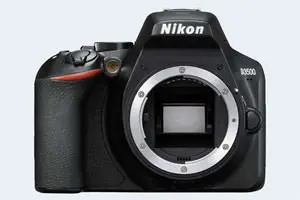Sony RX100 II vs Nikon D3500
The Sony Cyber-shot DSC-RX100 II and the Nikon D3500 are two digital cameras that were revealed to the public, respectively, in June 2013 and August 2018. The RX100 II is a fixed lens compact, while the D3500 is a DSLR. The cameras are based on an one-inch (RX100 II) and an APS-C (D3500) sensor. The Sony has a resolution of 20 megapixels, whereas the Nikon provides 24 MP.
Below is an overview of the main specs of the two cameras as a starting point for the comparison.

Check RX100 II offers at
ebay.com

Check D3500 offers at
ebay.com
Going beyond this snapshot of core features and characteristics, what are the differences between the Sony Cyber-shot DSC-RX100 II and the Nikon D3500? Which one should you buy? Read on to find out how these two cameras compare with respect to their body size, their imaging sensors, their shooting features, their input-output connections, and their reception by expert reviewers.
Body comparison
The physical size and weight of the Sony RX100 II and the Nikon D3500 are illustrated in the side-by-side display below. The two cameras are presented according to their relative size. Three successive views from the front, the top, and the rear are shown. All width, height and depth measures are rounded to the nearest millimeter.
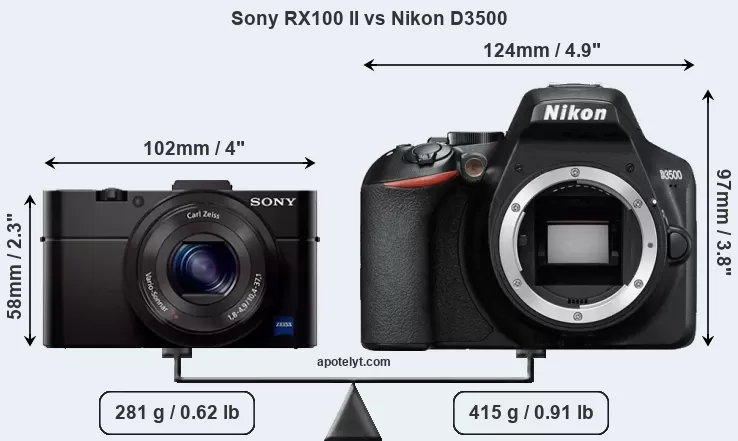
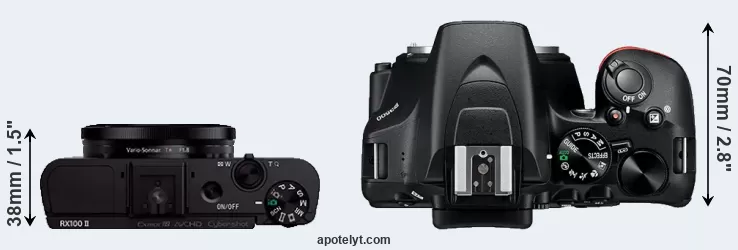
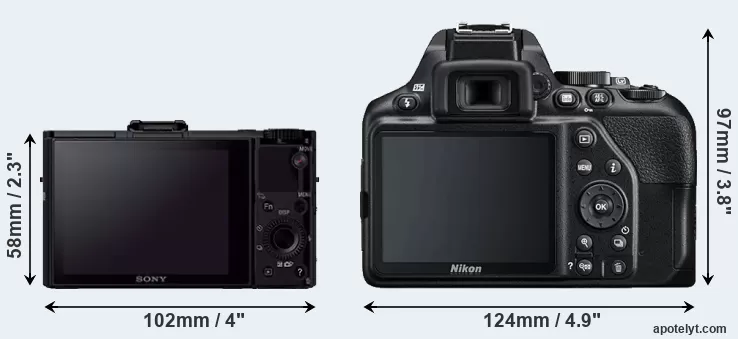
If the front view area (width x height) of the cameras is taken as an aggregate measure of their size, the Nikon D3500 is considerably larger (103 percent) than the Sony RX100 II. In this context, it is worth noting that neither the RX100 II nor the D3500 are weather-sealed.
The above size and weight comparisons are to some extent incomplete and possibly misleading, as the RX100 II has a lens built in, whereas the D3500 is an interchangeable lens camera that requires a separate lens. Attaching the latter will add extra weight and bulk to the setup. You can compare the optics available for the D3500 and their specifications in the Nikon Lens Catalog.
Concerning battery life, the RX100 II gets 350 shots out of its Sony NP-BX1 battery, while the D3500 can take 1550 images on a single charge of its Nikon EN-EL14a power pack. The power pack in the RX100 II can be charged via the USB port, so that it is not always necessary to take the battery charger along when travelling.
The following table provides a synthesis of the main physical specifications of the two cameras and other similar ones. If you want to switch the focus of the display and review another camera pair, you can move across to the CAM-parator tool and choose from the broad selection of possible camera comparisons there.

| Camera Model |
Camera Width |
Camera Height |
Camera Depth |
Camera Weight |
Battery Life |
Weather Sealing |
Camera Launch |
Launch Price (USD) |
Street Price |
||
|---|---|---|---|---|---|---|---|---|---|---|---|
| 1. | Sony RX100 II | 102 mm | 58 mm | 38 mm | 281 g | 350 | n | Jun 2013 | 749 | ebay.com | |
| 2. | Nikon D3500 | 124 mm | 97 mm | 70 mm | 415 g | 1550 | n | Aug 2018 | 429 | ebay.com | |
| 3. | Canon G7 X | 103 mm | 60 mm | 40 mm | 304 g | 210 | n | Sep 2014 | 699 | ebay.com | |
| 4. | Nikon D3200 | 125 mm | 96 mm | 77 mm | 505 g | 540 | n | Apr 2012 | 599 | ebay.com | |
| 5. | Nikon D3300 | 124 mm | 98 mm | 76 mm | 430 g | 700 | n | Jan 2014 | 499 | ebay.com | |
| 6. | Nikon D3400 | 124 mm | 98 mm | 76 mm | 445 g | 1200 | n | Aug 2016 | 499 | ebay.com | |
| 7. | Nikon D5300 | 125 mm | 98 mm | 76 mm | 480 g | 600 | n | Oct 2013 | 799 | ebay.com | |
| 8. | Nikon D5600 | 124 mm | 97 mm | 70 mm | 465 g | 970 | n | Nov 2016 | 699 | ebay.com | |
| 9. | Panasonic FZ1000 | 137 mm | 99 mm | 131 mm | 831 g | 360 | n | Jun 2014 | 899 | ebay.com | |
| 10. | Ricoh GR | 117 mm | 61 mm | 35 mm | 245 g | 290 | n | Apr 2013 | 799 | ebay.com | |
| 11. | Sony RX100 | 102 mm | 58 mm | 36 mm | 240 g | 330 | n | Jun 2012 | 649 | ebay.com | |
| 12. | Sony RX100 III | 102 mm | 58 mm | 41 mm | 290 g | 320 | n | May 2014 | 799 | ebay.com | |
| 13. | Sony RX100 IV | 102 mm | 58 mm | 41 mm | 298 g | 280 | n | Jun 2015 | 999 | ebay.com | |
| 14. | Sony RX100 V | 102 mm | 58 mm | 41 mm | 299 g | 220 | n | Oct 2016 | 999 | ebay.com | |
| 15. | Sony RX100 VII | 102 mm | 58 mm | 43 mm | 302 g | 260 | n | Jul 2019 | 1,199 | amazon.com | |
| 16. | Sony ZV-1 | 105 mm | 60 mm | 44 mm | 294 g | 260 | n | May 2020 | 799 | ebay.com | |
| 17. | Sony ZV-1 II | 106 mm | 60 mm | 47 mm | 292 g | 290 | n | May 2023 | 899 | amazon.com | |
| Note: Measurements and pricing do not include easily detachable parts, such as add-on or interchangeable lenses or optional viewfinders. | |||||||||||
Any camera decision will naturally be influenced heavily by the price. The manufacturer’s suggested retail prices give an idea on the placement of the camera in the maker’s lineup and the broader market. Usually, retail prices stay at first close to the launch price, but after several months, discounts become available. Later in the product cycle and, in particular, when the replacement model is about to appear, further discounting and stock clearance sales often push the camera price considerably down.
Sensor comparison
The size of the imaging sensor is a crucial determinant of image quality. All other things equal, a large sensor will have larger individual pixel-units that offer better low-light sensitivity, wider dynamic range, and richer color-depth than smaller pixels in a sensor of the same technological generation. Moreover, a large sensor camera will give the photographer more control over depth-of-field in the image and, thus, the ability to better isolate a subject from the background. On the downside, larger sensors tend to be more expensive and lead to bigger and heavier cameras and lenses.
Of the two cameras under consideration, the Sony RX100 II features an one-inch sensor and the Nikon D3500 an APS-C sensor. The sensor area in the D3500 is 216 percent bigger. As a result of these sensor size differences, the cameras have a format factor of, respectively, 2.7 and 1.5. Both cameras have a native aspect ratio (sensor width to sensor height) of 3:2.
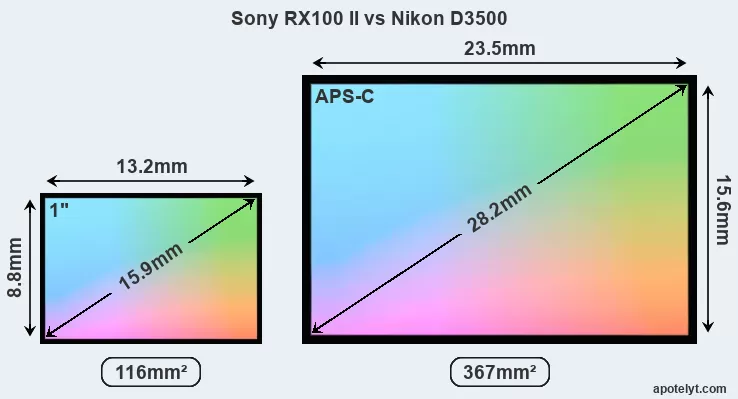
With 24MP, the D3500 offers a higher resolution than the RX100 II (20MP), but the D3500 nevertheless has larger individual pixels (pixel pitch of 3.91μm versus 2.41μm for the RX100 II) due to its larger sensor. Moreover, the D3500 is a much more recent model (by 5 years and 2 months) than the RX100 II, and its sensor will have benefitted from technological advances during this time that further enhance the light gathering capacity of its pixel-units. Coming back to sensor resolution, it should be mentioned that the D3500 has no anti-alias filter installed, so that it can capture all the detail its sensor resolves.
The resolution advantage of the Nikon D3500 implies greater flexibility for cropping images or the possibility to print larger pictures. The maximum print size of the D3500 for good quality output (200 dots per inch) amounts to 30 x 20 inches or 76.2 x 50.8 cm, for very good quality (250 dpi) 24 x 16 inches or 61 x 40.6 cm, and for excellent quality (300 dpi) 20 x 13.3 inches or 50.8 x 33.9 cm. The corresponding values for the Sony RX100 II are 27.4 x 18.2 inches or 69.5 x 46.3 cm for good quality, 21.9 x 14.6 inches or 55.6 x 37.1 cm for very good quality, and 18.2 x 12.2 inches or 46.3 x 30.9 cm for excellent quality prints.
The Sony Cyber-shot DSC-RX100 II has a native sensitivity range from ISO 100 to ISO 12800, which can be extended to ISO 100-25600. The corresponding ISO settings for the Nikon D3500 are ISO 100 to ISO 25600 (no boost).
In terms of underlying technology, the RX100 II is build around a BSI-CMOS sensor, while the D3500 uses a CMOS imager. Both cameras use a Bayer filter for capturing RGB colors on a square grid of photosensors. This arrangement is found in most digital cameras.
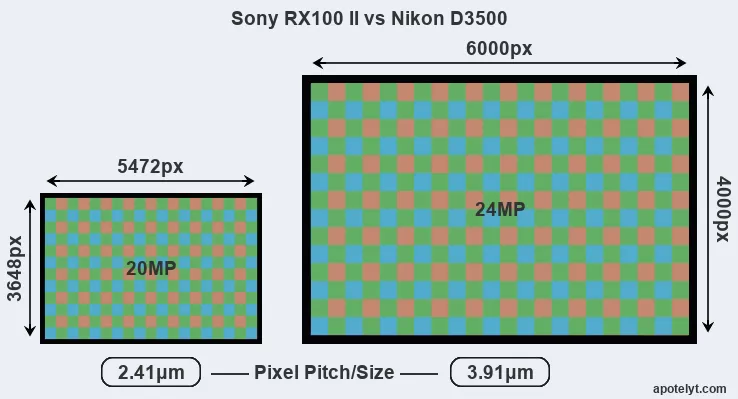
Consistent information on actual sensor performance is available from DXO Mark for many cameras. This service is based on lab testing and assigns an overall score to each camera sensor, as well as ratings for dynamic range ("DXO Landscape"), color depth ("DXO Portrait"), and low-light sensitivity ("DXO Sports"). The adjacent table reports on the physical sensor characteristics and the outcomes of the DXO sensor quality tests for a sample of comparator-cameras.

| Camera Model |
Sensor Class |
Resolution (MP) |
Horiz. Pixels |
Vert. Pixels |
Video Format |
DXO Portrait |
DXO Landscape |
DXO Sports |
DXO Overall |
||
|---|---|---|---|---|---|---|---|---|---|---|---|
| 1. | Sony RX100 II | 1-inch | 20.0 | 5472 | 3648 | 1080/60p | 22.5 | 12.4 | 483 | 67 | |
| 2. | Nikon D3500 | APS-C | 24.0 | 6000 | 4000 | 1080/60p | 24.0 | 13.4 | 1851 | 83 | |
| 3. | Canon G7 X | 1-inch | 20.0 | 5472 | 3648 | 1080/60p | 23.0 | 12.7 | 556 | 71 | |
| 4. | Nikon D3200 | APS-C | 24.1 | 6016 | 4000 | 1080/30p | 24.1 | 13.2 | 1131 | 81 | |
| 5. | Nikon D3300 | APS-C | 24.0 | 6000 | 4000 | 1080/60p | 24.3 | 12.8 | 1385 | 82 | |
| 6. | Nikon D3400 | APS-C | 24.0 | 6000 | 4000 | 1080/60p | 24.8 | 13.9 | 1192 | 86 | |
| 7. | Nikon D5300 | APS-C | 24.0 | 6000 | 4000 | 1080/60p | 24.0 | 13.9 | 1338 | 83 | |
| 8. | Nikon D5600 | APS-C | 24.0 | 6000 | 4000 | 1080/60p | 24.1 | 14.0 | 1306 | 84 | |
| 9. | Panasonic FZ1000 | 1-inch | 20.0 | 5472 | 3648 | 4K/30p | 22.1 | 11.7 | 517 | 64 | |
| 10. | Ricoh GR | APS-C | 16.1 | 4928 | 3264 | 1080/30p | 23.6 | 13.5 | 972 | 78 | |
| 11. | Sony RX100 | 1-inch | 20.0 | 5472 | 3648 | 1080/60p | 22.6 | 12.4 | 390 | 66 | |
| 12. | Sony RX100 III | 1-inch | 20.0 | 5472 | 3648 | 1080/60p | 22.4 | 12.3 | 495 | 67 | |
| 13. | Sony RX100 IV | 1-inch | 20.0 | 5472 | 3648 | 4K/30p | 22.8 | 12.6 | 591 | 70 | |
| 14. | Sony RX100 V | 1-inch | 20.0 | 5472 | 3648 | 4K/30p | 22.8 | 12.4 | 586 | 70 | |
| 15. | Sony RX100 VII | 1-inch | 20.0 | 5472 | 3648 | 4K/30p | 21.8 | 12.4 | 418 | 63 | |
| 16. | Sony ZV-1 | 1-inch | 20.0 | 5472 | 3648 | 4K/30p | 22.2 | 12.6 | 669 | 66 | |
| 17. | Sony ZV-1 II | 1-inch | 20.0 | 5472 | 3648 | 4K/30p | 22.3 | 12.9 | 965 | 67 | |
| Note: DXO values in italics represent estimates based on sensor size and age. | |||||||||||
Many modern cameras are not only capable of taking still images, but also of capturing video footage. The two cameras under consideration both have sensors whose read-out speed is fast enough to capture moving pictures, and both provide the same movie specifications (1080/60p).
Feature comparison
Apart from body and sensor, cameras can and do differ across a variety of features. For example, the D3500 has an optical viewfinder, which can be very useful when shooting in bright sunlight. In contrast, the RX100 II relies on live view and the rear LCD for framing. That said, the RX100 II can be equipped with an optional viewfinder – the FDA-EV1MK. The following table reports on some other key feature differences and similarities of the Sony RX100 II, the Nikon D3500, and comparable cameras.

| Camera Model |
Viewfinder (Type or 000 dots) |
Control Panel (yes/no) |
LCD Specifications (inch/000 dots) |
LCD Attach- ment |
Touch Screen (yes/no) |
Max Shutter Speed * |
Max Shutter Flaps * |
Built-in Flash (yes/no) |
Built-in Image Stab |
||
|---|---|---|---|---|---|---|---|---|---|---|---|
| 1. | Sony RX100 II | optional | n | 3.0 / 1229 | tilting | n | 1/2000s | 10.0/s | Y | Y | |
| 2. | Nikon D3500 | optical | n | 3.0 / 921 | fixed | n | 1/4000s | 5.0/s | Y | n | |
| 3. | Canon G7 X | none | n | 3.0 / 1040 | tilting | Y | 1/2000s | 6.5/s | Y | Y | |
| 4. | Nikon D3200 | optical | n | 3.0 / 921 | fixed | n | 1/4000s | 4.0/s | Y | n | |
| 5. | Nikon D3300 | optical | n | 3.0 / 921 | fixed | n | 1/4000s | 5.0/s | Y | n | |
| 6. | Nikon D3400 | optical | n | 3.0 / 921 | fixed | n | 1/4000s | 5.0/s | Y | n | |
| 7. | Nikon D5300 | optical | n | 3.2 / 1037 | swivel | n | 1/4000s | 5.0/s | Y | n | |
| 8. | Nikon D5600 | optical | n | 3.2 / 1037 | swivel | Y | 1/4000s | 5.0/s | Y | n | |
| 9. | Panasonic FZ1000 | 2359 | n | 3.0 / 921 | swivel | n | 1/4000s | 12.0/s | Y | Y | |
| 10. | Ricoh GR | optional | n | 3.0 / 1230 | fixed | n | 1/4000s | 4.0/s | Y | n | |
| 11. | Sony RX100 | none | n | 3.0 / 1229 | fixed | n | 1/2000s | 10.0/s | Y | Y | |
| 12. | Sony RX100 III | 1440 | n | 3.0 / 1229 | tilting | n | 1/2000s | 10.0/s | Y | Y | |
| 13. | Sony RX100 IV | 2359 | n | 3.0 / 1228 | tilting | n | 1/2000s | 16.0/s | Y | Y | |
| 14. | Sony RX100 V | 2359 | n | 3.0 / 1229 | tilting | n | 1/2000s | 24.0/s | Y | Y | |
| 15. | Sony RX100 VII | 2359 | n | 3.0 / 921 | tilting | Y | 1/2000s | 90.0/s | Y | Y | |
| 16. | Sony ZV-1 | none | n | 3.0 / 922 | swivel | Y | 1/2000s | 24.0/s | n | n | |
| 17. | Sony ZV-1 II | none | n | 3.0 / 922 | swivel | Y | 1/2000s | 24.0/s | n | n | |
| Note: *) Information refers to the mechanical shutter, unless the camera only has an electronic one. | |||||||||||
The RX100 II writes its imaging data to SDXC or Memory Stick PRO Duo cards, while the D3500 uses SDXC cards. The D3500 supports UHS-I cards (Ultra High Speed data transfer of up to 104 MB/s), while the RX100 II cannot take advantage of Ultra High Speed SD cards.
Connectivity comparison
For some imaging applications, the extent to which a camera can communicate with its environment can be an important aspect in the camera decision process. The table below provides an overview of the connectivity of the Sony Cyber-shot DSC-RX100 II and Nikon D3500 and, in particular, the interfaces the cameras (and selected comparators) provide for accessory control and data transfer.

| Camera Model |
Hotshoe Port |
Internal Mic / Speaker |
Microphone Port |
Headphone Port |
HDMI Port |
USB Port |
WiFi Support |
NFC Support |
Bluetooth Support |
||
|---|---|---|---|---|---|---|---|---|---|---|---|
| 1. | Sony RX100 II | Y | stereo / mono | - | - | micro | 2.0 | Y | Y | - | |
| 2. | Nikon D3500 | Y | mono / mono | - | - | mini | 2.0 | - | - | Y | |
| 3. | Canon G7 X | - | stereo / mono | - | - | micro | 2.0 | Y | Y | - | |
| 4. | Nikon D3200 | Y | mono / mono | Y | - | mini | 2.0 | - | - | - | |
| 5. | Nikon D3300 | Y | mono / mono | Y | - | mini | 2.0 | - | - | - | |
| 6. | Nikon D3400 | Y | mono / mono | - | - | mini | 2.0 | - | - | Y | |
| 7. | Nikon D5300 | Y | stereo / mono | Y | - | mini | 2.0 | Y | - | - | |
| 8. | Nikon D5600 | Y | stereo / mono | Y | - | mini | 2.0 | Y | Y | Y | |
| 9. | Panasonic FZ1000 | Y | stereo / mono | Y | - | micro | 2.0 | Y | Y | - | |
| 10. | Ricoh GR | Y | mono / mono | - | - | micro | 2.0 | - | - | - | |
| 11. | Sony RX100 | - | stereo / mono | - | - | micro | 2.0 | - | - | - | |
| 12. | Sony RX100 III | - | stereo / mono | - | - | micro | 2.0 | Y | Y | - | |
| 13. | Sony RX100 IV | - | stereo / mono | - | - | micro | 2.0 | Y | Y | - | |
| 14. | Sony RX100 V | - | stereo / mono | - | - | micro | 2.0 | Y | Y | - | |
| 15. | Sony RX100 VII | - | stereo / mono | Y | - | micro | 2.0 | Y | Y | Y | |
| 16. | Sony ZV-1 | Y | stereo / mono | Y | - | micro | 2.0 | Y | - | Y | |
| 17. | Sony ZV-1 II | Y | stereo / mono | Y | - | micro | 2.0 | Y | - | Y |
It is notable that the RX100 II offers wifi support, while the D3500 does not. Wifi can be a very convenient means to transfer image data to an off-camera location.
Both the RX100 II and the D3500 have been discontinued, but can regularly be found used on ebay. The RX100 II was replaced by the Sony RX100 III, while the D3500 does not have a direct successor. Further information on the features and operation of the RX100 II and D3500 can be found, respectively, in the Sony RX100 II Manual (free pdf) or the online Nikon D3500 Manual.
Review summary
So what conclusions can be drawn? Is there a clear favorite between the Sony RX100 II and the Nikon D3500? Which camera is better? The listing below highlights the relative strengths of the two models.

Reasons to prefer the Sony Cyber-shot DSC-RX100 II:
- Better moiré control: Has an anti-alias filter to avoid artificial patterns to appear in images.
- More detailed LCD: Has a higher resolution rear screen (1229k vs 921k dots).
- More flexible LCD: Has a tilting screen for odd-angle shots in landscape orientation.
- Faster burst: Shoots at higher frequency (10 vs 5 flaps/sec) to capture the decisive moment.
- Ready to shoot: Comes with a built-in lens, while the D3500 requires a separate lens.
- More compact: Is smaller (102x58mm vs 124x97mm) and thus needs less room in the bag.
- Less heavy: Is lighter even though it comes with a built-in lens (unlike the D3500).
- Easier travel charging: Can be conveniently charged via its USB port.
- Sharper images: Has hand-shake reducing image stabilization built-in.
- Easier file upload: Has wifi built in for automatic backup or image transfer to the web.
- Easier device pairing: Supports NFC for fast wireless image transfer over short distances.
- More heavily discounted: Has been available for much longer (launched in June 2013).

Arguments in favor of the Nikon D3500:
- More detail: Has more megapixels (24 vs 20MP), which boosts linear resolution by 10%.
- Maximized detail: Lacks an anti-alias filter to exploit the sensor's full resolution potential.
- Better image quality: Is equipped with a larger and more technologically advanced sensor.
- Richer colors: The sensor size advantage translates into images with better, more accurate colors.
- More dynamic range: Larger sensor captures a wider spectrum of light and dark details.
- Better low-light sensitivity: Larger sensor produces good images even in poorly lit environments.
- Easier framing: Has an optical viewfinder for image composition and settings control.
- Faster shutter: Has higher mechanical shutter speed (1/4000s vs 1/2000s) to freeze action.
- More flexible: Makes it possible to change lenses and thus to use specialty optics.
- Longer lasting: Gets more shots (1550 versus 350) out of a single battery charge.
- Easier wireless transfer: Supports Bluetooth for image sharing without cables.
- Faster buffer clearing: Has an SD card interface that supports the UHS-I standard.
- More modern: Reflects 5 years and 2 months of technical progress since the RX100 II launch.
If the count of individual advantages (bullet points above) is taken as a guide, the D3500 comes out slightly ahead of the RX100 II (13 : 12 points). However, the relevance of individual strengths will vary across photographers, so that you might want to apply your own weighing scheme to the summary points when reflecting and deciding on a new camera. A professional wildlife photographer will view the differences between cameras in a way that diverges from the perspective of a family photog, and a person interested in architecture has distinct needs from a sports shooter. Hence, the decision which camera is best and worth buying is often a very personal one.
How about other alternatives? Do the specifications of the Sony RX100 II and the Nikon D3500 place the cameras among the top in their class? Find out in the latest Best Travel-Zoom Camera and Best DSLR Camera listings whether the two cameras rank among the cream of the crop.
In any case, while the comparison of the spec-sheets of cameras can offer a general idea of their imaging potential, it remains partial and cannot reveal, for example, the shooting experience and imaging performance when actually working with the RX100 II or the D3500. User reviews that are available, for instance, at amazon can sometimes shed light on these issues, but such feedback is all too often partial, inconsistent, and inaccurate.
Expert reviews
This is why hands-on reviews by experts are important. The adjacent summary-table relays the overall verdicts of several of the most popular camera review sites (amateurphotographer [AP], cameralabs [CL], digitalcameraworld [DCW], dpreview [DPR], ephotozine [EPZ], photographyblog [PB]). As can be seen, the professional reviewers agree in many cases on the quality of different cameras, but sometimes their assessments diverge, reinforcing the earlier point that a camera decision is often a very personal choice.

| Camera Model |
AP score |
CL score |
DCW score |
DPR score |
EPZ score |
PB score |
Camera Launch |
Launch Price (USD) |
Street Price |
||
|---|---|---|---|---|---|---|---|---|---|---|---|
| 1. | Sony RX100 II | 5/5 | + + | .. | 79/100 | 4.5/5 | 4.5/5 | Jun 2013 | 749 | ebay.com | |
| 2. | Nikon D3500 | 4/5 | .. | 4/5 | 75/100 | 4/5 | 4.5/5 | Aug 2018 | 429 | ebay.com | |
| 3. | Canon G7 X | 4/5 | + + | .. | 77/100 | 4.5/5 | 4.5/5 | Sep 2014 | 699 | ebay.com | |
| 4. | Nikon D3200 | 5/5 | + + | .. | 73/100 | 4.5/5 | 4.5/5 | Apr 2012 | 599 | ebay.com | |
| 5. | Nikon D3300 | 3/5 | + | .. | 77/100 | 4.5/5 | 4.5/5 | Jan 2014 | 499 | ebay.com | |
| 6. | Nikon D3400 | 4/5 | + | 4/5 | 76/100 | 4/5 | 4.5/5 | Aug 2016 | 499 | ebay.com | |
| 7. | Nikon D5300 | 4/5 | + + | .. | 79/100 | 4.5/5 | 4.5/5 | Oct 2013 | 799 | ebay.com | |
| 8. | Nikon D5600 | 4/5 | .. | 4/5 | 79/100 | 4.5/5 | 4/5 | Nov 2016 | 699 | ebay.com | |
| 9. | Panasonic FZ1000 | 4/5 | + + | .. | 82/100 | 4.5/5 | 4.5/5 | Jun 2014 | 899 | ebay.com | |
| 10. | Ricoh GR | 5/5 | .. | .. | 79/100 | 4.5/5 | 4.5/5 | Apr 2013 | 799 | ebay.com | |
| 11. | Sony RX100 | 5/5 | + + | .. | 78/100 | 4/5 | 5/5 | Jun 2012 | 649 | ebay.com | |
| 12. | Sony RX100 III | 5/5 | + + | .. | 82/100 | 4.5/5 | 5/5 | May 2014 | 799 | ebay.com | |
| 13. | Sony RX100 IV | 4.5/5 | + + | .. | 85/100 | 4/5 | 4.5/5 | Jun 2015 | 999 | ebay.com | |
| 14. | Sony RX100 V | 4.5/5 | + + | .. | 83/100 | 4/5 | 4.5/5 | Oct 2016 | 999 | ebay.com | |
| 15. | Sony RX100 VII | 4.5/5 | .. | 4/5 | .. | 4/5 | 5/5 | Jul 2019 | 1,199 | amazon.com | |
| 16. | Sony ZV-1 | 4/5 | + | 4/5 | 85/100 | 4/5 | 4.5/5 | May 2020 | 799 | ebay.com | |
| 17. | Sony ZV-1 II | 4.5/5 | .. | 3.5/5 | 83/100 | 3.5/5 | 4.5/5 | May 2023 | 899 | amazon.com | |
| Note: (+ +) highly recommended; (+) recommended; (o) reviewed; (..) not available. | |||||||||||
The above review scores should be interpreted with care, though. The assessments were made in relation to similar cameras of the same technological generation. Thus, a score needs to be put into the context of the launch date and the launch price of the camera, and comparisons of ratings among very different cameras or across long time periods have little meaning. Also, kindly note that some of the listed sites have over time developped their review approaches and their reporting style.

Check RX100 II offers at
ebay.com

Check D3500 offers at
ebay.com
Other camera comparisons
Did this review help to inform your camera decision process? In case you would like to check on the differences and similarities of other camera models, just make your choice using the following search menu. There is also a set of direct links to comparison reviews that other users of the CAM-parator app explored.
- Canon R vs Sony RX100 II
- Fujifilm X-A7 vs Nikon D3500
- Fujifilm X-T3 vs Nikon D3500
- Leica S2 vs Nikon D3500
- Nikon D3500 vs Ricoh GR IIIx
- Nikon D3500 vs Sony A6500
- Nikon D3500 vs Sony A77
- Nikon W150 vs Sony RX100 II
- Nikon Z7 vs Sony RX100 II
- Panasonic G85 vs Sony RX100 II
- Panasonic GX7 vs Sony RX100 II
- Panasonic L10 vs Sony RX100 II
Specifications: Sony RX100 II vs Nikon D3500
Below is a side-by-side comparison of the specs of the two cameras to facilitate a quick review of their differences and common features.
| Camera Model | Sony RX100 II | Nikon D3500 |
|---|---|---|
| Camera Type | Fixed lens compact camera | Digital single lens reflex |
| Camera Lens | 28-100mm f/1.8-4.9 | Nikon F mount lenses |
| Launch Date | June 2013 | August 2018 |
| Launch Price | USD 749 | USD 429 |
| Sensor Specs | Sony RX100 II | Nikon D3500 |
| Sensor Technology | BSI-CMOS | CMOS |
| Sensor Format | 1" Sensor | APS-C Sensor |
| Sensor Size | 13.2 x 8.8 mm | 23.5 x 15.6 mm |
| Sensor Area | 116.16 mm2 | 366.6 mm2 |
| Sensor Diagonal | 15.9 mm | 28.2 mm |
| Crop Factor | 2.7x | 1.5x |
| Sensor Resolution | 20 Megapixels | 24 Megapixels |
| Image Resolution | 5472 x 3648 pixels | 6000 x 4000 pixels |
| Pixel Pitch | 2.41 μm | 3.91 μm |
| Pixel Density | 17.18 MP/cm2 | 6.55 MP/cm2 |
| Moiré control | Anti-Alias filter | no AA filter |
| Movie Capability | 1080/60p Video | 1080/60p Video |
| ISO Setting | 100 - 12,800 ISO | 100 - 25,600 ISO |
| ISO Boost | 100 - 25,600 ISO | no Enhancement |
| Image Processor | BIONZ X | EXPEED 4 |
| DXO Sensor Quality (score) | 67 | .. |
| DXO Color Depth (bits) | 22.5 | .. |
| DXO Dynamic Range (EV) | 12.4 | .. |
| DXO Low Light (ISO) | 483 | .. |
| Screen Specs | Sony RX100 II | Nikon D3500 |
| Viewfinder Type | Viewfinder optional | Optical viewfinder |
| Viewfinder Field of View | 95% | |
| Viewfinder Magnification | 0.57x | |
| LCD Framing | Live View | Live View |
| Rear LCD Size | 3.0inch | 3.0inch |
| LCD Resolution | 1229k dots | 921k dots |
| LCD Attachment | Tilting screen | Fixed screen |
| Shooting Specs | Sony RX100 II | Nikon D3500 |
| Focus System | Contrast-detect AF | Phase-detect AF |
| Manual Focusing Aid | Focus Peaking | no Peaking Feature |
| Continuous Shooting | 10 shutter flaps/s | 5 shutter flaps/s |
| Fill Flash | Built-in Flash | Built-in Flash |
| Storage Medium | MS or SDXC cards | SDXC cards |
| Single or Dual Card Slots | Single card slot | Single card slot |
| UHS card support | no | UHS-I |
| Connectivity Specs | Sony RX100 II | Nikon D3500 |
| External Flash | Hotshoe | Hotshoe |
| USB Connector | USB 2.0 | USB 2.0 |
| HDMI Port | micro HDMI | mini HDMI |
| Wifi Support | Wifi built-in | no Wifi |
| Near-Field Communication | NFC built-in | no NFC |
| Bluetooth Support | no Bluetooth | Bluetooth built-in |
| Body Specs | Sony RX100 II | Nikon D3500 |
| Battery Type | Sony NP-BX1 | Nikon EN-EL14a |
| Battery Life (CIPA) | 350 shots per charge | 1550 shots per charge |
| In-Camera Charging | USB charging | no USB charging |
| Body Dimensions |
102 x 58 x 38 mm (4.0 x 2.3 x 1.5 in) |
124 x 97 x 70 mm (4.9 x 3.8 x 2.8 in) |
| Camera Weight | 281 g (9.9 oz) | 415 g (14.6 oz) |

Check RX100 II offers at
ebay.com

Check D3500 offers at
ebay.com
Did you notice an error on this page? If so, please get in touch, so that we can correct the information.

